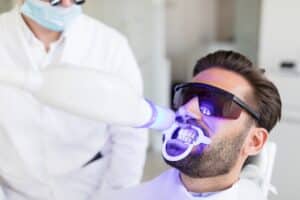Tooth infections, while painful and inconvenient, are usually treatable with prompt dental care. However, in rare cases, an untreated tooth infection can spread and lead to serious, even life-threatening complications. Here’s how to distinguish between a typical tooth infection and one that requires immediate medical attention.
Understanding Tooth Infections
A tooth infection occurs when bacteria invade the pulp, the soft inner core of your tooth, containing nerves and blood vessels. This can happen due to deep decay, a cracked tooth, or gum disease. Symptoms of a typical tooth infection include:
- Throbbing toothache: This is often the most noticeable symptom, and the pain can be constant or come in waves.
- Sensitivity to hot and cold: The tooth may become sensitive to hot or cold beverages and foods.
- Swollen gums: The gum tissue around the infected tooth may become red, swollen, and tender.
- Facial swelling: In some cases, the infection can spread to the surrounding tissues, causing facial swelling.
- Pus drainage: An abscess, a pus-filled pocket at the tip of the tooth’s root, may form and drain pus.
- Fever: A low-grade fever may accompany the infection.
Signs of a Potentially Serious Infection
While these symptoms are concerning, they can usually be managed with antibiotics and dental treatment. However, some signs indicate a potentially life-threatening infection and require immediate medical attention:
- High fever (over 102°F): A high fever can be a sign that the infection has spread to other parts of your body.
- Severe facial swelling: Significant facial swelling, especially if it spreads to the eyes or neck, can indicate a serious infection.
- Difficulty breathing or swallowing: If the infection spreads to the tissues around the airway or throat, it can cause difficulty breathing or swallowing.
- Redness around the eye: Swelling or redness around the eye can be a sign of a serious infection called cavernous sinus thrombosis.
- Confusion or mental changes: Confusion or altered mental state can indicate that the infection has reached the bloodstream.
- Numbness or tingling in the face: Numbness or tingling can be a sign of nerve damage caused by the infection.
When to See a Dentist
If you experience any of the following symptoms, seek immediate medical attention:
- High fever
- Severe facial swelling
- Difficulty breathing or swallowing
- Redness around the eye
- Confusion or mental changes
Suppose you experience any other symptoms of a tooth infection, such as a throbbing toothache, sensitivity, or swollen gums. In that case, it’s crucial to visit Dr. Peter Truong Vo, a professional dentist in Keller, TX. Early diagnosis and treatment can prevent the infection from worsening and potentially becoming life-threatening.
Seeking Emergency Dental Care
Many dentists reserve time slots for emergency dental care. Call your dentist immediately if you experience a dental emergency. If your dentist is unavailable, proceed to the nearest emergency dental office or urgent care center.
Preventing Tooth Infections
The best way to deal with a tooth infection is to prevent it from happening in the first place. Here are some tips for maintaining good oral health and reducing your risk of tooth infections:
- Brush your teeth twice a day and floss once a day: This removes food particles and plaque that can harbor bacteria.
- Schedule regular dental checkups and cleanings: Your dentist can identify and address any potential problems early on.
- Maintain a healthy diet: Limit sugary foods and drinks, as they can contribute to tooth decay.
- Don’t smoke or use tobacco products: Smoking weakens the immune system and increases the risk of infection.
Tooth infections are a common dental problem, but they shouldn’t be ignored. While most infections can be treated effectively with antibiotics and dental care, it’s crucial to be aware of the signs of a potentially life-threatening infection. If you experience any of the severe symptoms mentioned earlier, seek immediate medical attention. By prioritizing good oral hygiene and seeking prompt dental care when needed, you can minimize your risk of complications and maintain a healthy smile.





